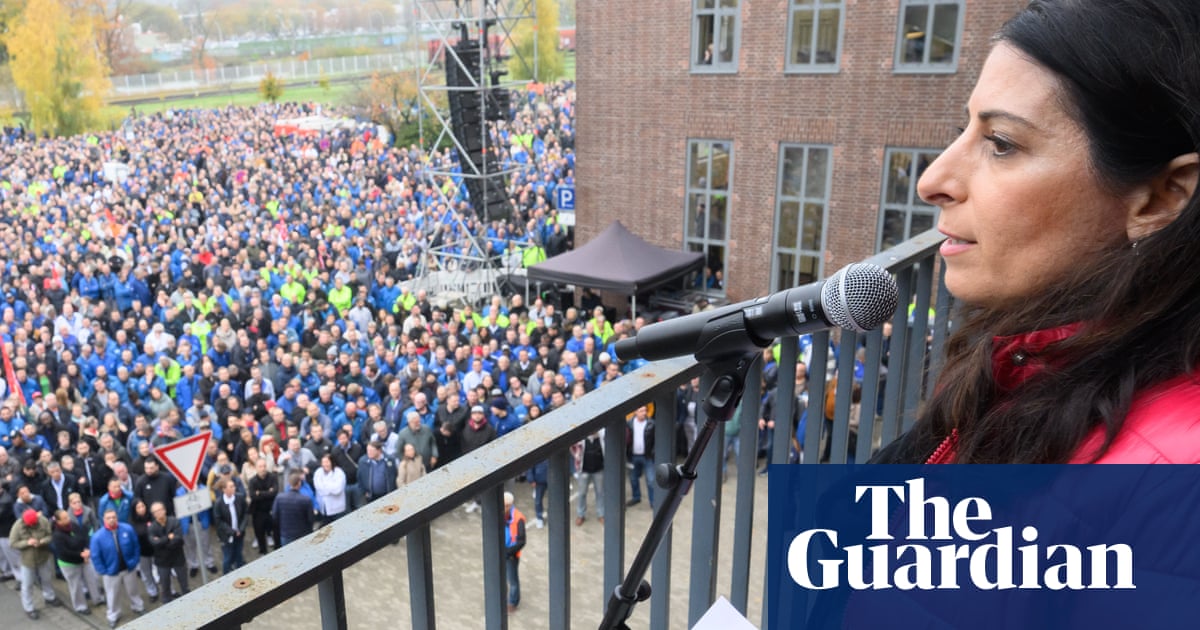The German carmaker Volkswagen is planning to shut at least three factories in its home country, lay off thousands of workers and cut pay by 10%, according to the company’s union.
The deeper-than-expected cuts come as the company faces weak sales and slow expansion in the electric vehicle (EV) sector amid tough competition from Chinese manufacturers.
“The board wants to close at least three factories in Germany,” the works council chief, Daniela Cavallo, told employees at VW’s headquarters in Wolfsburg on Monday. Its remaining manufacturing sites will reduce capacity, she said, citing information provided by management.
As Europe’s top economy suffers a crisis in manufacturing and fears of mass unemployment, VW is aiming for a fundamental restructuring to cut costs. It had initially warned last month that it had the equivalent of two factories of extra capacity in Germany.
Redundancies are expected across the workforce, amounting to tens of thousands of jobs and whole divisions closed or sent overseas. Real-terms pay cuts could amount to as much as 18% after a two-year pay freeze, the works council said. “All German VW plants are affected by these plans,” Cavallo said. “None is safe.”
The works council said the factory in the northern city of Osnabrück, in Lower Saxony, which recently lost a major contract with Porsche, VW’s subsidiary, was threatened with closure. However, that could prove politically contentious as Lower Saxony’s government is Volkswagen’s second-largest shareholder, with 20% of voting rights. The state’s leader, Stephan Weil, last month said plant closures should not be under consideration.
Cavallo also raised the prospect of industrial action if VW did not back down. She said the company was “playing with the massive risk that everything will soon escalate here” and workers will “do what a workforce has to do when it fears for its existence”.
Car companies are complaining of falling demand in many key markets after interest rates rose in recent years after the historic lows of more than a decade that followed the global financial crisis. Germany’s traditional manufacturers, including BMW, Mercedes-Benz and Porsche, have reported falling profits as Chinese sales in particular struggle.
At the same time, incumbent carmakers such as Volkswagen are having to come up with major investments needed to switch production from petrol and diesel to battery electric, while facing Chinese rivals who enjoy lower costs. Some factories had already been switched over, but slowing growth in demand for EVs has made companies less keen to make the job-saving investments.
Volkswagen employs more than 120,000 people in Germany, about half of those in Wolfsburg.
The company, which operates 10 sites in Germany under the VW brand, sent shock waves through the country in September with an announcement that it was considering the closure of factories in Germany for the first time in its history. To return to competitiveness, it said it would abolish its 30-year-old employment protection agreement as part of an attempt to save about €10bn.
Volkswagen said in a statement on Monday that its management had been in talks with labour representatives since the middle of 2023 about how to proceed, and had made clear over the summer that the “worsening economic situation required a fundamental restructuring”.
after newsletter promotion
It said management would put forward “concrete proposals to lower labour costs” at upcoming salary negotiations.
Gunnar Kilian, the head of human resources on the management board, said: “The fact is, the situation is serious and the responsibility of the negotiating partners is enormous.” He confirmed unspecified factory closures and painted a dire picture of the company’s condition.
The company said the automobile market in Europe, of which its share amounts to about a quarter, had shrunk by 2 million vehicles since 2020 while costs for energy, personnel and raw materials had grown. The sector was “stagnating and will not recover in the foreseeable future”, it said.
Volkswagen Passenger Cars’ chief executive, Thomas Schäfer, said the company’s German factories had significantly higher labour costs than the industry standard.

